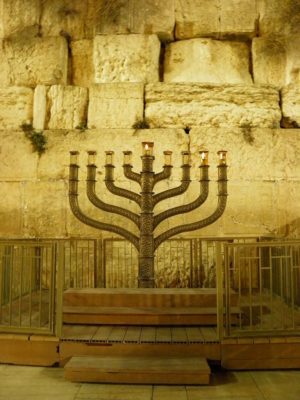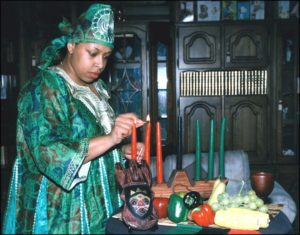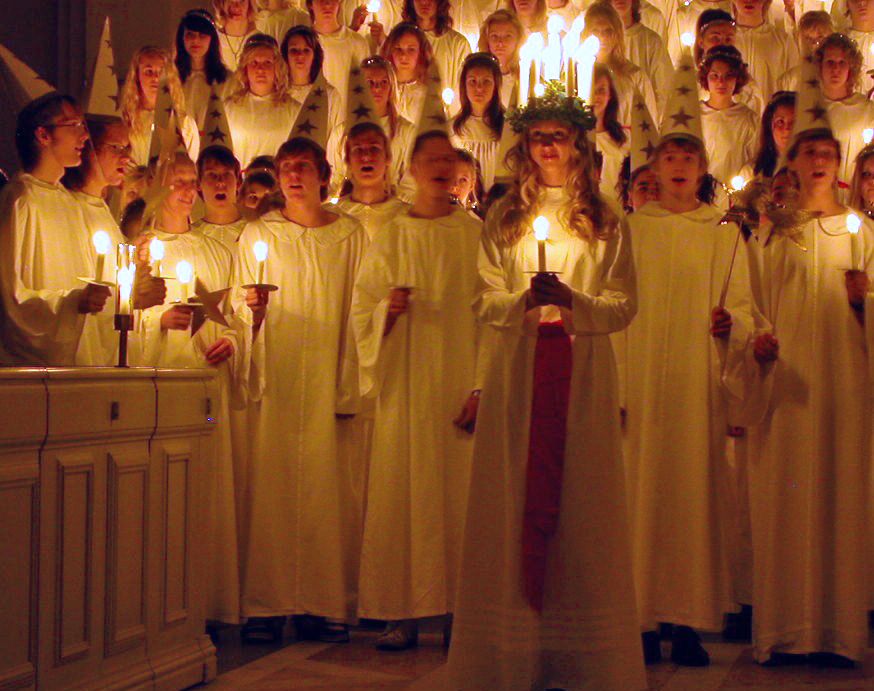Holiday Traditions
There are many different holidays and traditions people celebrate this time of the year
By Malene Thyssen – Own work, CC BY-SA 3.0, https://commons.wikimedia.org/w/index.php?curid=347204 By Claudia Gründer – Claudia Gründer, CC BY-SA 3.0, https://commons.wikimedia.org/w/index.php?curid=3221537
The Feast of Santa Lucia is one of many ways various holidays and celebrations are observed around the world this time of year.
During the holiday season, there are many different holidays people all over the world celebrate. From Christmas to Hanukkah to Kwanzaa, each one of these special holidays have their own beliefs and traditions.
Christmas is celebrated on December 25 to remember the birth of Jesus Christ, who Christians believe is the Son of God. Throughout the Christmas season there are many traditions people observe. For example, many people enjoy the ancient ritual of decorating a Christmas tree in their home.

An old-world traition for indoor trees is to place small candles at the end of each branch, only to be lit on Christmas Eve. The fire hazzard of this practice has resulted in most modern trees to be festooned instead with electric lights.
The round ornaments placed on the tree are supposed to represent the fruit of knowledge of good and evil from the first book in the Bible, Genesis. An angel or star often is placed at the top of the tree to represent the Archangel Gabriel or the star of Bethlehem. Santa is another popular figure who dominates Christmas celebrations during this festival time of year. He is a character children believe delivers presents on Christmas eve, for whom they leave milk and cookies to fuel him on his long journey that night. Around the world, there are a variety of different Christmas traditions. For example, in Europe during the days leading up to December 6, children put their shoes or a special St. Nicholas boot at the front door at night to find them filled with small presents the next morning. Many families enjoy hanging up lights in the spirit of Christmas as well. Christmas is a time that, for many, embodies the spirit of giving and enhances opportunities for spending quality time with family and friends.
Hanukkah is celebrated by the Jewish religion. Hanukkah commemorates the re dedication during the second century B.C. of the Second Temple in Jerusalem, where according to legend Jews had risen up against their Greek-Syrian oppressors in the Maccabean Revolt. Hanukah is often seen as a miracle because of the history of when there was only enough untainted olive oil to keep the menorah’s candles burning for a single day, the flames continued flickering for eight nights, leaving them time to find a fresh supply.

The menhorrah is the central symbol for the Jewish celebration of light.
This historic event inspired the Jews to have an 8-day long holiday to commemorate this unexplainable event from their past.The holiday begins on the 25th of Kislev in the Hebrew calendar and lasts 8 days. Celebrants light a candle displayed in an object called a menorah, which has 9 candles . Every day a new candle gets lit, with the ninth candle being used to light all the other candles. The menorah represents light and wisdom, with each candle representing each night. A variety of foods are cooked at this time, including potato latkes, which are fried pancakes of grated or ground potato, flour and egg, often flavored with grated garlic or onion and seasoning.
Kwanzaa is an African American holiday, which beings on December 26th and lasts through the 31st. The name Kwanzaa comes from the phrase “matunda ya kwanza” which means “first fruits” in Swahili. While each family tends to celebrate Kwanzaa in their own ways, celebrations often include singing and dancing, African drums playing, storytelling, poetry reading, and a large traditional African meal. Kwanzaa is a seven-night long holiday, on each of the seven nights a child lights a candle on the Kinara, which translates to “candle holder.”

Tech. Sgt. Jennifer Myers (above), 66th Air Base Wing noncommissioned officer in charge of the Military Equal Opportunity office, demonstrates a Kwanzaa ritual where she lights a candle in the Kinara.
There are seven principles that associate with Kwanzaa, values of African culture which contribute to growing and reinforcing society among African-Americans: unity, self-determination, collective work and responsibility, cooperative economics, purpose, creativity, and faith. Kwanzaa has seven symbols as well: crops, place mat, ear of corn, the seven candles, the candle holder, the unity cup, and gifts. These principles and symbols represent what Kwanzaa is all about. On the sixth night of Kwanzaa a huge feast is prepared, called Karamu. Prior to the meal a whole ceremony is presented, that includes commemorating the history of the African people. Kwanzaa is a very important holiday that teaches Africans what their culture and nationality is all about.
During this festive time of year, it is important to know about the traditions that other people celebrate, and recognize this time as very holy and sacred. Whether you celebrate Christmas, Hanukkah, or Kwanzaa, the spirit of family and spending time with loved ones is perhaps the greatest gift of all.

